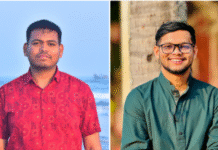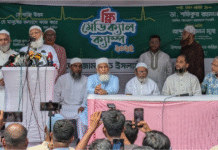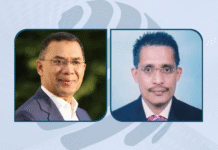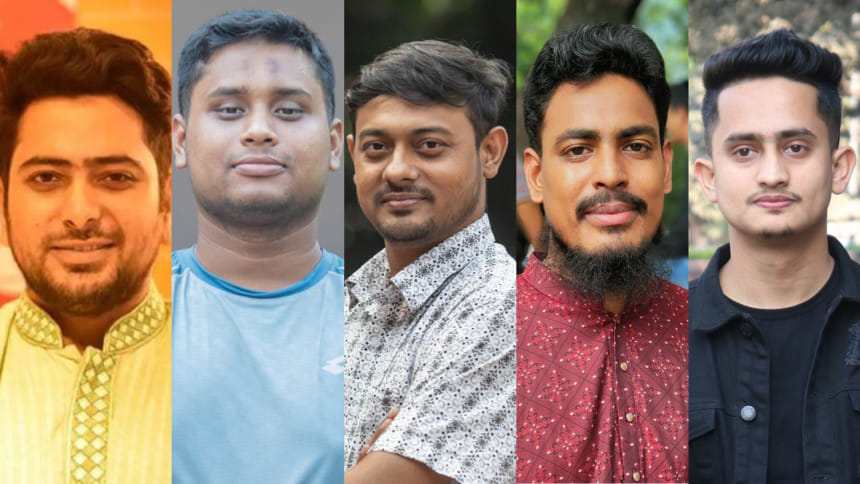
The July uprising participants are set to launch their much-anticipated new political party in the last week of this month, and they may also announce a new student organisation.
Initially, the party and the student organisation are expected to announce their convening committees. Nahid Islam, a key organiser of the anti-discrimination student movement and an adviser to the interim government, will likely take on a significant role in the new party, either as the convener or member secretary.
Besides, Jatiya Nagorik Committee Convener Nasir Uddin Patwary, Member Secretary Akhter Hossen and Chief Organiser Sarjis Alam, and Students Against Discrimination Convener Hasnat Abdullah may assume other key positions in the party, five leaders of the civic and students’ platforms told The Daily Star.
The two platforms held a series of meetings over the last few weeks to discuss the top posts of the new political party.
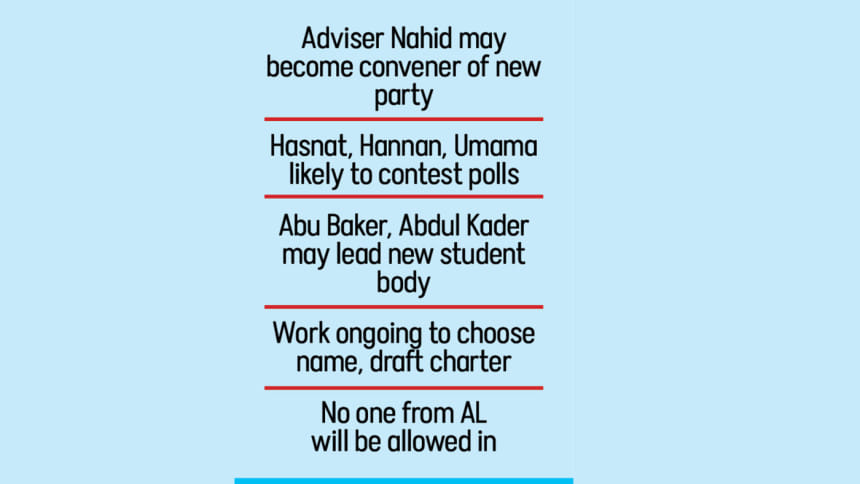
“The consensus so far is that Nahid Islam will be the convener of the new party. However, it all depends on Nahid’s decision,” said two key leaders of the Jatiya Nagorik Committee, requesting to be unnamed.
Two other student representatives in the government — Asif Mahmud Shojib Bhuiyan and Mahfuj Alam — may join the party as well.
However, to generate momentum and attract more public interest, the two platforms are discussing whether the advisers should join the political party after the announcement of an electoral roadmap.
Several leaders of Students Against Discrimination will join the new political party and its Convener Hasnat may even run in the national elections from his hometown of Cumilla, said the sources.
Its Chief Organiser Abdul Hannan Masud and Coordinator Mahin Sarkar are likely to join the party and Hannan might contest the polls from Hatia. The platform’s spokesperson Umama Fatema may also join the party and even vie for a seat in parliament.
Talking to this newspaper, Akhter Hossen said, “We will lead the party with a centrist ideology — neither right-wing nor left-wing. Our ideological framework will be set from a middle ground.”
CONVENING COMMITTEE
The initial convening committee of the party will comprise 60 to 72 members, while a fully-fledged leadership structure will be made through a council later. A roadmap outlining the process of forming the party has already been developed, they said.
Injured protesters from the 2024 movement will be included in the party in order to fulfil the aspirations of the families of the
victims of the Awami League’s brutal response to the uprising, they added.
A 17-member special committee has already been formed to draft the party’s charter by incorporating principles inspired by the movements of 1947, 1971, and 2024.
Constitutional experts, political analysts, and diplomats also gave their opinions on the charter so that the global democratic norms are aligned.
In the charter, the aspirations of young people will be prioritised, alongside a commitment to economy, healthcare, education, gender equality, and religious tolerance.
Sources in the Jatiya Nagorik Committee said although the party’s name has not been finalised yet, an extensive organisational groundwork is being done through the committees of these two platforms.
They are also examining the structure, operation and political practice of some youth-based parties in South Asia, including the Aam Aadmi Party and Lok Janshakti Party of India, Imran Khan’s Pakistan Tehreek-e-Insaf and the National People’s Power of Sri Lanka.
The Jatiya Nagorik Committee formed committees in over 100 thanas and 235 upazilas, comprising students, young professionals, former bureaucrats, journalists, lawyers, business leaders, political figures, and civil society members.
Students Against Discrimination also established 50 committees at various levels, including districts and upazilas.
The two platforms on February 6 launched a nationwide campaign to know from people what they want from the party.
Under the slogan “Your Vision for a New Bangladesh”, five key questions are being posed to the public: “Which three actions do you think would change the country?”, “What personal issues do you expect the new party to address?”, “What do you expect from the new party?”, “What should the party be named?”, and “What should be the party’s symbol?”
The platforms have so far collected opinions of two lakh people. They aim to gather opinions from more than half a million people by the end of the campaign.
The names proposed by the respondents of the campaign include the People’s Revolution Party, People’s Power Party, United Revolution Party, United People’s Party, Equality and Development Party, Revolutionary People’s Party, Democratic People’s Party, July Spirit Party, and Civic Democratic Party.
Clarifying their stance, Akhter Hossen said, “Individuals involved in the Awami League, especially those engaged in murder, extortion, and the July massacre, will not be allowed to join the new party.”
He, however, said that people from other political parties, including the BNP, Jamaat-e-Islami, and leftist groups, are welcome to join.
NEW STUDENT BODY
The student organisation, which is likely to be announced alongside the party, will start its journey with a central convening committee. Another convening committee for Dhaka University is also expected to be announced.
The central committee is likely to comprise 171 or 201 members, while the Dhaka University unit will be slightly smaller.
Two key coordinators of Students Against Discrimination are likely to assume leadership roles in the student organisation. They are Abu Baker Majumdar, a fourth-year student of Geology Department at Dhaka University, and Abdul Kader, a postgraduate student at the Institute of Social Welfare and Research at DU.
Other coordinators of the platform, Rashidul Islam Rifat, Hasib Al Islam, and Jahid Ahsan, may also join the new student body.
After the formation of the central and DU panels, committees will be formed in colleges, universities, and districts across the country.
The student leaders said while the new student body will align ideologically with the new political party, it will remain independent and autonomous.
There are plans to set a maximum age limit of 27–28 years for members, along with a rule that they would not be able to be in the student body after seven years since enrolment into undergraduate programmes.
“The new student organisation will uphold the aspirations of the July uprising and work inclusively with students of all backgrounds,” Abdul Kader told this newspaper.

